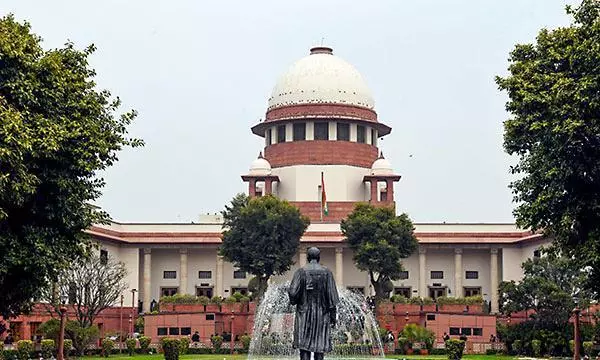
SC upholds dismissal of Army officer over refusal to enter multi-faith shrine
Bench says officer a 'misfit for the Indian Army' and someone who allowed his 'religious ego' to override discipline, unity and respect for his fellow soldiers

The Supreme Court on Tuesday (November 25) strongly criticised a Christian officer of the Indian Army who had refused to enter the sanctum sanctorum of his regiment’s sarva dharma sthal (a place of worship for all faiths), dismissing his petition challenging his dismissal from service.
The court emphasised that soldiers cannot place personal religious interpretations above the collective ethos of the armed forces.
Also Read: SC flags misuse of rape law in failed relationships, quashes FIR
The bench described him as a "cantankerous man" and a "misfit", upholding the Army’s decision to remove him for failing to respect the faith of his Sikh colleagues.
SC condemns 'religious ego' in uniform
A bench of Chief Justice of India Surya Kant and Justice Joymalya Bagchi held that the officer was a "misfit for the Indian Army" and someone who had allowed his "religious ego" to override discipline, unity and respect for the men he commanded.
Calling his conduct "the grossest form of contempt and indiscipline," the bench said such a "cantankerous attitude is not acceptable in an armed force".
"What kind of message is he sending? Gross indiscipline by an Army officer. He should have been terminated. This kind of cantankerous person deserves to be in the military?" the bench led by Chief Justice Surya Kant remarked.
"He may be an outstanding officer, but he is a misfit for the Indian Army. The responsibilities our forces shoulder at this time… this is not the behaviour we can entertain."
Terminated for breach of discipline
Samuel Kamalesan joined the Indian Army as a Lieutenant in the 3rd Cavalry Regiment in 2017. The regiment comprised three squadrons, Sikh, Jat and Rajput. He served as the troop leader of Squadron B, which consists of Sikh personnel.
Also Read: Governors, President can’t sit on bills indefinitely but timelines can’t be fixed: SC
In 2021, he was dismissed for repeatedly refusing to enter the sarva dharma sthal, despite instructions from his commanding officer and reassurance from a pastor that doing so would not violate his faith. The structure contained a gurdwara and a temple.
In May, the Delhi High Court upheld the Army’s decision, holding that Kamalesan "kept his religion above a lawful command from his superior," describing it as an act of indiscipline.
The Supreme Court also criticised his plea, with Justice Joymalya Bagchi noting that he had disregarded even his pastor’s advice. "When your pastor counsels you, you leave it at that. You cannot have your private understanding of what your religion permits, that too, in uniform," the court observed.
Conduct insulting of fellow soldiers
Senior advocate Gopal Sankaranarayanan, appearing for Kamalesan, argued that his client’s monotheistic faith prevented him from entering the innermost area of a structure that housed both a gurdwara and a temple. He contended that the officer feared being compelled to perform rituals prohibited by his faith.
"This one place in Punjab did not have a sarv dharm sthal (i.e., a structure symbolising the unity of all religions, such as the one inside the Parliament building in Delhi). It had a gurdwara," he said.
The bench, however, rejected the explanation. "He has demonstrated the grossest form of contempt and indiscipline. He should have been dismissed solely on the basis of his conduct," it held.
Noting that he commanded Sikh, Jat and Rajput soldiers, the court said his behaviour insulted the sentiments of his own men. "You are a troop leader and your troop comprises Sikh soldiers. They are in a gurdwara, and this is how he conducts himself? The tone and tenor of his refusal are insulting."
Constitutional religious rights cited
Sankaranarayanan argued that the Constitution protects both the right to practise one’s religion and the right to refrain from participating in other religious practices. He maintained that the officer had entered places of worship but had objected only when asked to perform rituals.
The bench responded that the officer acted out of "religious ego", ignoring even pastoral guidance. "He says he would not enter such a place even if it had a church. If this is the attitude of a troop leader in an armed force, the less said the better."
"You may hold personal beliefs, but this was not an essential feature of your religion, as advised by your pastor. Essential features must be respected, and likewise you must respect the collective faith of your men as a troop officer," the court stated.
The bench added that his personal interpretation could not supersede discipline, "Your understanding of your religious rights cannot override everything else. Where in your faith does entering a place of worship interfere with your religion?"
Court dismisses petition
Sankaranarayanan argued that the Army had dismissed him for a single infraction and that the officer had shown respect for other religions by participating in festivals such as Holi and Diwali.
"He was standing outside the sanctum. He told them he would do anything else they asked outside but entering the sanctum was against his faith," the advocate said, maintaining that only one superior officer had objected.
Also Read: SC on ‘digital arrests’: Determined to deal ‘with iron hands’
Concluding that his conduct violated the Army’s secular fabric and discipline, the bench said, “He may excel in several ways, but he is a misfit for the Indian Army—an absolute misfit.”
The court then dismissed the appeal against the Delhi High Court’s 30 May order, stating, “We see no ground to interfere with the impugned order… The petition is dismissed.”

